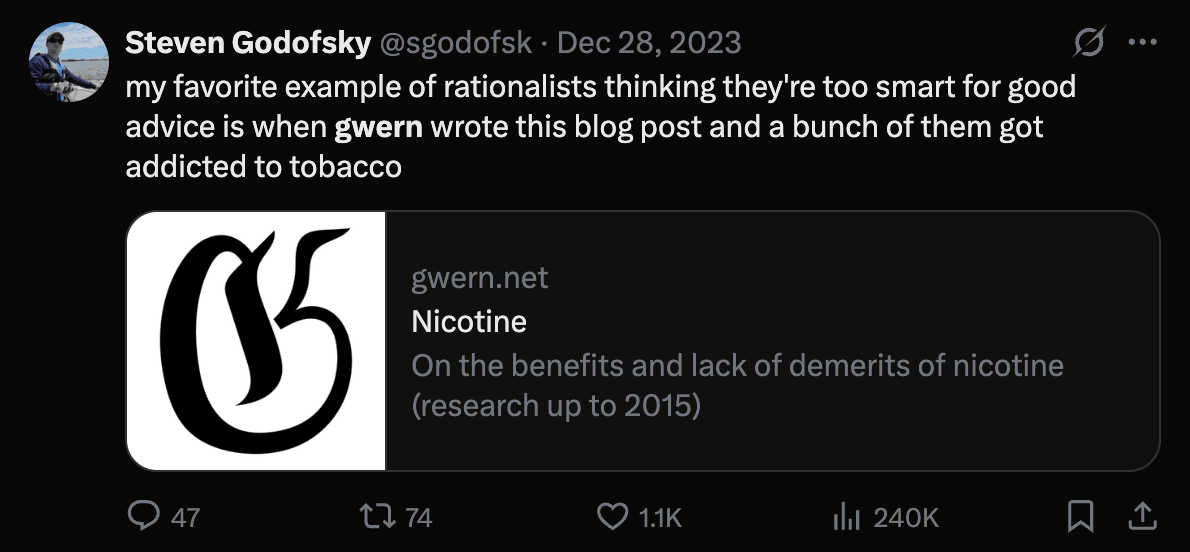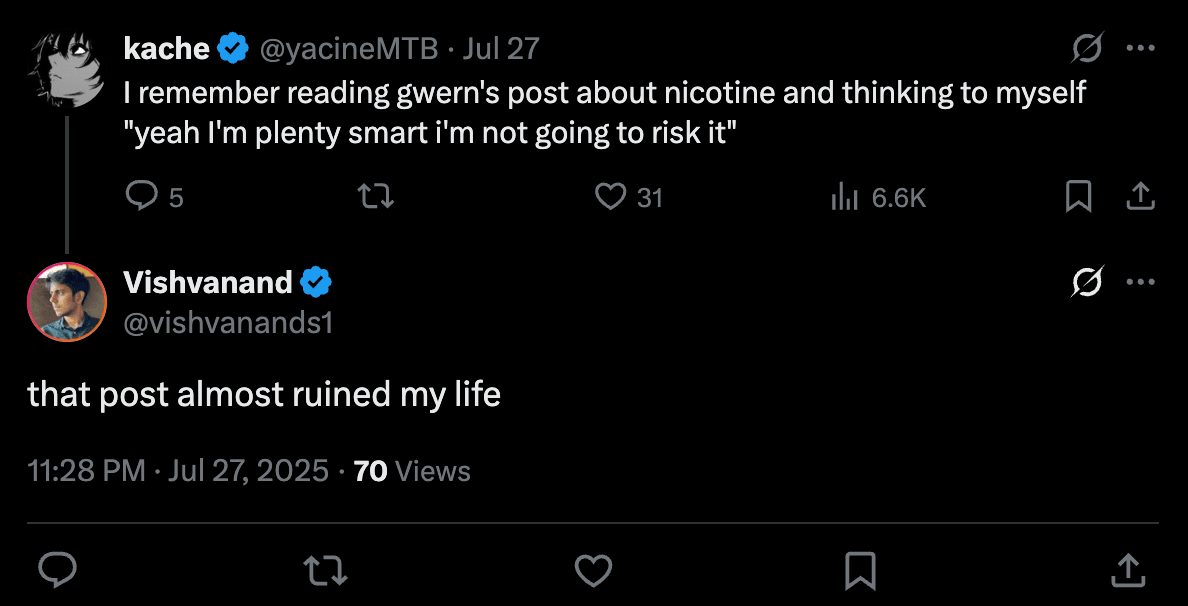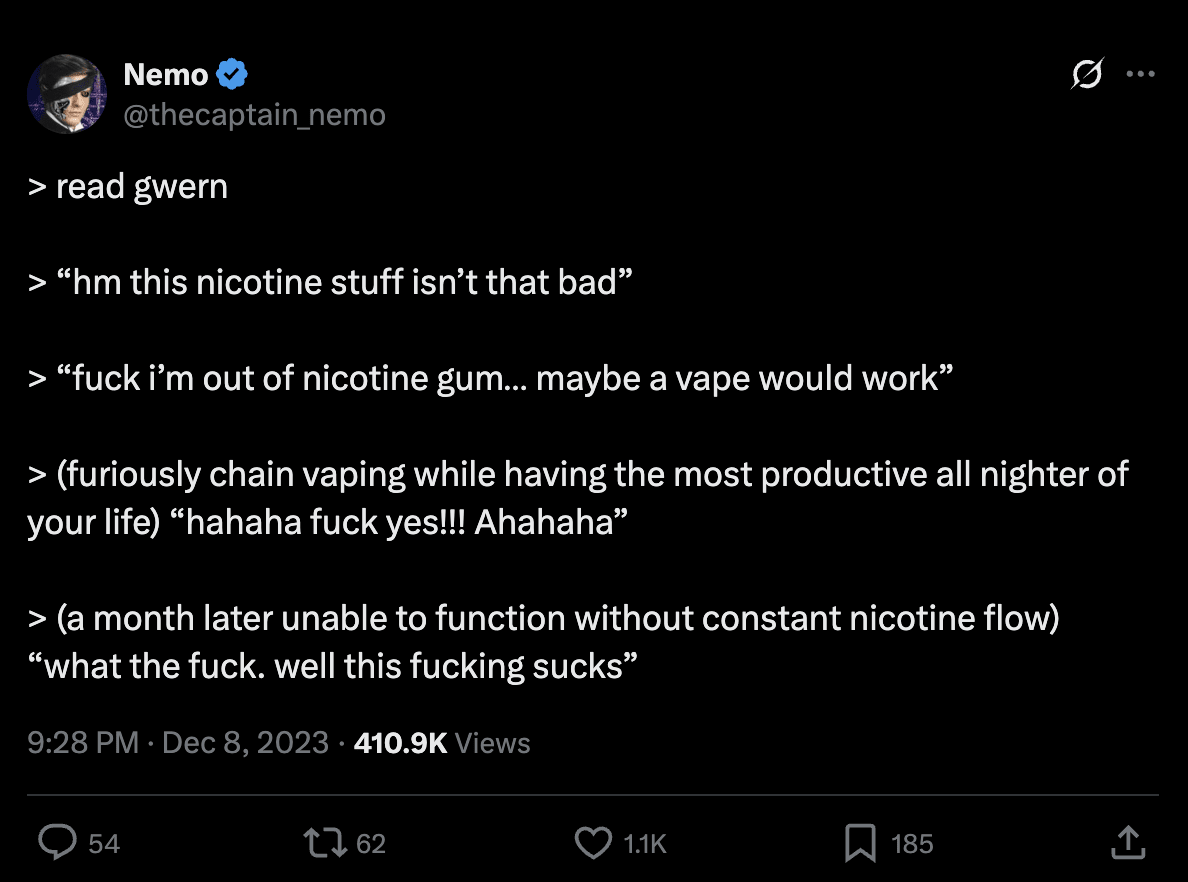Two years ago an attractive woman handed me two nicotine mints — 2 mg each, a fairly small dose. She was spontaneous, with dark hair and an annoyingly white smile, a drug geek who worked at some vaguely neurotech-y startup. I liked her and had her phone number. But I needed something interesting to text her.
Teenage boys pick up smoking to look cool and impress girls. I’m in my thirties — too late for that strategy. But trying nicotine sublingually? This might work as a conversation starter.
Don’t get me wrong, it was not my only motivation for trying nicotine. I’d long been aware of its cognitive enhancement effects — ever since I read Gwern’s piece on benefits of nicotine. But I’d been hesitant to actually try it. I already took two stimulants daily: lisdexamfetamine for ADHD and caffeine for my many-years-long addiction. Did I really need another stimulant? Every few months I’d ponder this, and the answer would always be “No.” Until that day.
I slipped a mint under my tongue and did a bunch of household chores feeling like I gained +5 IQ points. I texted her about this — she liked my texts. In the end, she didn’t like me back.
But my romance with nicotine started that day: I’ve been using it regularly ever since.
Some of you are thinking: “Dumb fuck, he got addicted himself to nicotine, what else did he expect other than regular use”. I am not addicted to it: I’ve been using 2-3 times a week on average, and once weekly in the last few weeks. And I only take nicotine sublingually via lozenges.
I am not unusually resistant to addiction. If anything, the opposite:
For the last 15 years I’ve been drinking caffeinated beverages, Coca-Cola and tea, almost daily. This is an addiction, if mild, benign, and socially-approved.
Ten years ago I went through a few months of nearly-daily drinking. It took several attempts to quit, and cravings continued for a long while.
In the last two years I binged on mephedrone (an entactogen, MDMA’s deranged cousin) every 3-6 weeks. It may not sound like a lot, but the cravings for it can get really strong. Fun fact: once I ran out of mephedrone during a binge, but I wanted to do Just One More Line, so I collected the residual mephedrone from the carpet and snorted it. Second fun fact: it wasn’t just one time.
Enough about my vices. My point is: I have a bit of an addictive personality.
The route of administration matters crucially for additional potential. Cigarettes are “nicotine crack” — the form that hits your bloodstream the hardest and fastest. It also subsides quickly — nicotine has a short half-life of two hours. This “hit hard and subside” pattern is what drives addiction. In contrast, lozenges release nicotine slowly and steadily, allowing you to maintain a stable blood concentration for prolonged periods without the peaks and valleys of cigarettes.
Nicotine is habit-forming in the literal sense: It helps you form habits. It’s remarkably good at reinforcing behaviors associated with it. One reason it’s hard to quit smoking is that you don’t have to quit just nicotine itself, but nicotine paired with the smoking ritual. But nicotine can help build useful habits.
I used to use nicotine for going to the gym. After working with a powerlifting coach for a few months (one hour, twice weekly), I hit a patch where I didn’t have enough disposable income to continue. So I started using nicotine to work out. I wouldn’t crave nicotine on its own, but I’d frequently crave lifting on it. Lifting plus nicotine is more fun than either alone. On nicotine I had my three most productive training months: I’d go to the gym 2-3 times a week, for a total of 3-4.5 hours weekly.
The subjective experience of habit formation is interesting. You know how games like GTA highlight important objects with visual markers? Nicotine sometimes creates this effect for me by warping the space around objects — in the same way cute boys and girls warp space in your experience, making you literally attracted to them. For example, I’d approach the gym, see its door and I’d feel oddly drawn to it. Or I’d pass by three benches in a new gym, spot the one I’d benched on two days ago, and feel like it’s a Special Bench That I Need To Lift On Right Now.
The only problem was tolerance — nicotine slowly lost some of its effectiveness. Nothing dramatic, but it meant I couldn’t use nicotine for other purposes without further decreasing its effectiveness and increasing side effects like sleep disturbances and some next-day fatigue.
Nicotine’s modulating effect on experiential fields is general. Aside from creating positive fields for habits, it also reduces negative fields.
You know how when you procrastinate, you get so used to procrastinating that in your mind the idea of doing the task gets coated with an unpleasant film that sort of repulses you from acting on it? You go: ugh, why do I have to do it. Hence the name — ugh fields.
Nicotine is a wonder drug for reducing these fields of negative self-conditioning: ugh fields simply go away on it. Occasionally I build up a pile of unanswered emails by procrastinating — and on nicotine my mind powers through them like a knife through butter. “Dumb” chores like laundry or cleaning are great to do while coming down from nicotine — when there’s enough nicotine left in the system to strip the ugh field but not enough to push physical training or intellectual work.
There is a classic stereotype of writers chain-smoking to write better, but I was still surprised by how much nicotine improves the process. First, nicotine dampens anxiety and makes you comfortable baring the insides of your mind you’re normally ashamed about. Second, it just straight-up increases your working memory capacity, which in practice allows you to connect different threads more efficiently, find words more quickly, and not lose your train of thought.
I am often kind of dumb and disabled when it comes to writing without nicotine. I get various blocks in different parts of the process: sometimes writing the first draft, and more often editing it into the final version. Nicotine almost always removes these blocks.
Incidentally, this essay is sponsored by the five one-milligram nicotine lozenges I consumed while writing it.
Writing on nicotine is just so much fun. To limit cravings, I almost always write in the same cafe in London at night (called the London Night Cafe). The cravings I occasionally get aren’t for writing on nicotine, but for writing on nicotine in that specific environment. This makes them easy to ignore when I have other things to do — to satisfy them I’d have to take a 15 minute bike or bus ride.
People often think that taking cognitive enhancers is borrowing productivity from the future. You might get smarter and more productive today, but you inevitably pay a price for this by crashing and rebounding.
This hasn’t been my experience. Using nicotine for a few hours at a time and spacing out days limits the rebound. The productivity gain outweighs the following drop. My hypothesis: if you are not on a drug 24/7 then a nicotine ‘hit and run’ basically works — you can reap the benefits and return the brain to baseline, ceasing the reason for it to counteract the drug’s effect. Laying a rigorous systematic argument for this hypothesis is outside of the scope of this post, so feel free to take it with a grain of salt.
Also sometimes, borrowing from the future is just fine actually. I’m strategic with doses. If I have an important deadline for submitting something at 9AM on Saturday, I might take nicotine Friday evening for a final push concentrating all productivity where it counts. On Saturday I don’t need to be productive — it’s the weekend, so the rebound is fine.
For me, sublingual nicotine’s addictive potential feels low — significantly lower than caffeine’s. But your brain makeup might be different, for genetic or behavioural reasons. For example, ex-smokers are particularly susceptible to re-developing addiction.
There are many stories about people reading Gwern’s piece on nicotine and developing addiction (see the screenshots in the next block). I knew about these stories, but ignored them anyway, feeling like I was very smart. I was right and I reaped huge benefits: sublingual nicotine has had a big positive effect on my life at limited cost.
Maybe I am playing with fire. But playing with fire is how our cavemen ancestors started building this civilization — controlled risk-taking drives progress. If anything, I wish we played with fire harder and funded a research program for nicotine analogues to discover an even better cognitive enhancer.
.png)










